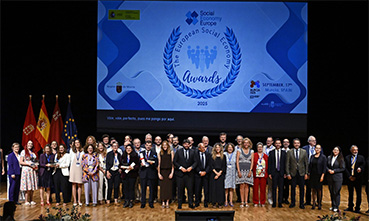On September 17, the city of Murcia hosted the third edition of the Social Economy Awards, a gala framed within the European Social Economy Summit, organised by Social Economy Europe (SEE) together with CEPES, the Ministry of Labour and Social Economy, and the Government and City Council of Murcia. The event brought together European leaders, institutions, and organisations to recognise the most outstanding social economy initiatives on the continent. Among those present were Roxana Minzatu, European Commissioner for Employment and Social Rights, and Amparo Merino, Spain’s Secretary of State for Social Economy.
Since its creation in 2021, the Social Economy Europe (SEE) Awards have aimed to give visibility to exemplary projects that embody the values of the social economy. In this edition, SEE received 140 applications from 35 European countries, which were evaluated by a jury of experts and representatives of European institutions.
The awards were distributed in five categories: training, local governments, housing, clean energy, and social innovation in work integration social enterprises (WISEs), all linked to strategic priorities of the European Union, such as social cohesion, ecological transition, and integration.
Training and Education
The first recognition went to EdukaCoop, an initiative of the Association of Social Economy Enterprises of Navarre (ANEL) in Spain. This project integrates cooperative values into schools and universities, with more than 2,500 students already involved, who have also had the opportunity to visit and learn in depth from social economy business experiences.
2nd place: Passerelles et Compétences (France), for connecting professional volunteers with NGOs.
3rd place: İzmir, Another School is Possible Education Cooperative (Turkey), for its democratic and sustainable educational model.
Local Governments
In this category, the French city of Strasbourg was recognised as a European benchmark thanks to its participatory public policies and cooperative ecosystem. The city promotes cooperative development through initiatives such as the Social and Solidarity Economy Council and the 100% Learning Territory, which foster co-designed public policies and support entrepreneurship.
2nd place: Service Public de Wallonie (Belgium), for its Alternativ’ES Wallonia strategy.
3rd place: Region of Murcia (Spain), for its historic Pact for Excellence in the Social Economy.
Special mention: Peloponnese Trails (Greece), which revitalises rural areas through sustainable tourism.
Housing
The main award went to the Catalan cooperative Sostre Cívic, which manages more than 550 homes under a use-rights model, based on participation and sustainability. Founded in 2004, Sostre Cívic is a non-profit cooperative that tackles the region’s housing crisis by offering a sustainable and community-based alternative to the speculative real estate market.
2nd place: Community Land Trust Brussels (Belgium), a pioneer in community land trusts.
3rd place: WOGEBE (Germany), a housing cooperative in Trier.
Special mention: Just a Change (Portugal), dedicated to renovating homes for vulnerable families.
Clean Energy
In a context marked by the energy transition, the award was given to the French Association des Centrales Villageoises, which develops renewable energy projects managed by local communities.
2nd place: Robin Powerhood (Austria), for redistributing solar energy to families at risk of energy poverty.
3rd place: Brupower (Belgium), Brussels’ first citizen energy cooperative.
Social Innovation in Work Integration Social Enterprises (WISEs)
The Catalan Taller Àuria was awarded for its innovative model of labour inclusion in the perfume industry, where more than 70% of its workforce is made up of people with disabilities or at risk of exclusion.
2nd place: Formació i Treball Empresa d’Inserció (Spain), a leader in textile recycling and inclusive employment.
3rd place: Triest Press (Ireland), an inclusive printing company with more than 70 supported workers.
An inclusive and sustainable future
Through these awards, the European social economy reaffirms its role as a driver of change, capable of offering innovative and sustainable solutions to challenges such as housing, education, energy transition, and labour integration.
The 2025 edition delivered a clear message: in the face of the climate crisis, inequalities, and economic uncertainty, the social economy is consolidating itself as a viable model to build a more inclusive, democratic, and solidarity-based future across Europe.







